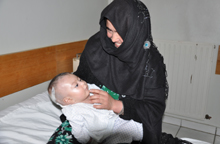A nick in time saves nine
A timely tele-consultation between doctors at the Faizabad Provinvcial Hospital and FMIC, Kabul saved one-month old Sidra’s life. The Kate Project, FMIC's patient welfare program's sponsor, arranged for full medical cost, transportation and accommodation for the family.
“Three decades of war, poverty and malnutrition have led to an increase in such cases in Afghanistan. The tele-consultation enabled doctors to detect Sidra's condition on time as there was a very slim chance of her survival,” says Dr Mohammad Akbar Shirzad, Consultant General Surgeon at FMIC, Kabul.
From the time of Sidra’s birth, it was obvious that she had a severe malformation of the brain that would require medical intervention. As she turned one month old, Sidra’s family decided to consult a local paediatrician in Faizabad who advised them to take her to the Faizabad Provincial Hospital (FPH).
Upon arrival, Sidra was admitted immediately.
A live tele-consultation with Dr Mohammad Akbar Shirzad, Consultant General Surgeon at the French Medical Institute for Children (FMIC), Kabul, led to a severe diagnosis: a complicated case of occipital meningoencephalocele, a protrusion of the brain through a birth defect in the skull bones.
 Realising the gravity of Sidra' condition from the tele-consultation, Dr Shirzad decided that she needed to come to FMIC for surgery.
Realising the gravity of Sidra' condition from the tele-consultation, Dr Shirzad decided that she needed to come to FMIC for surgery.
Sidra's father, Shabir Ahmad, is a primary school teacher in Badakhshan and the only bread winner for an eight-member family. His modest salary could afford neither the trip to FMIC nor the cost of surgery.
The Kate Project, FMIC's patient welfare program's sponsor, arranged for patient funds including full medical cost, transportation and accommodation for the family.
At FMIC, a team of surgeons successfully operated on Sidra, excising the occipital mass. A second operation was performed a week later to insert a ventriculoperitoneal shunt to relieve pressure from her brain caused by fluid accumulation.
"Three decades of war, poverty and malnutrition have led to an increase in such cases in Afghanistan. The tele-consultation enabled doctors to detect Sidra's condition on time as there was a very slim chance of her survival," says Dr Shirzad.
Sidra stayed in the pediatric ward for two days before getting discharged. She is now back with her family in Faizabad and has made a full recovery.
“Without the welfare program's assistance, it would have been impossible for me to afford Sidra's operation. We are grateful to the doctors at Faizabad and FMIC for saving my daughter's life,” says Shabir Ahmad.